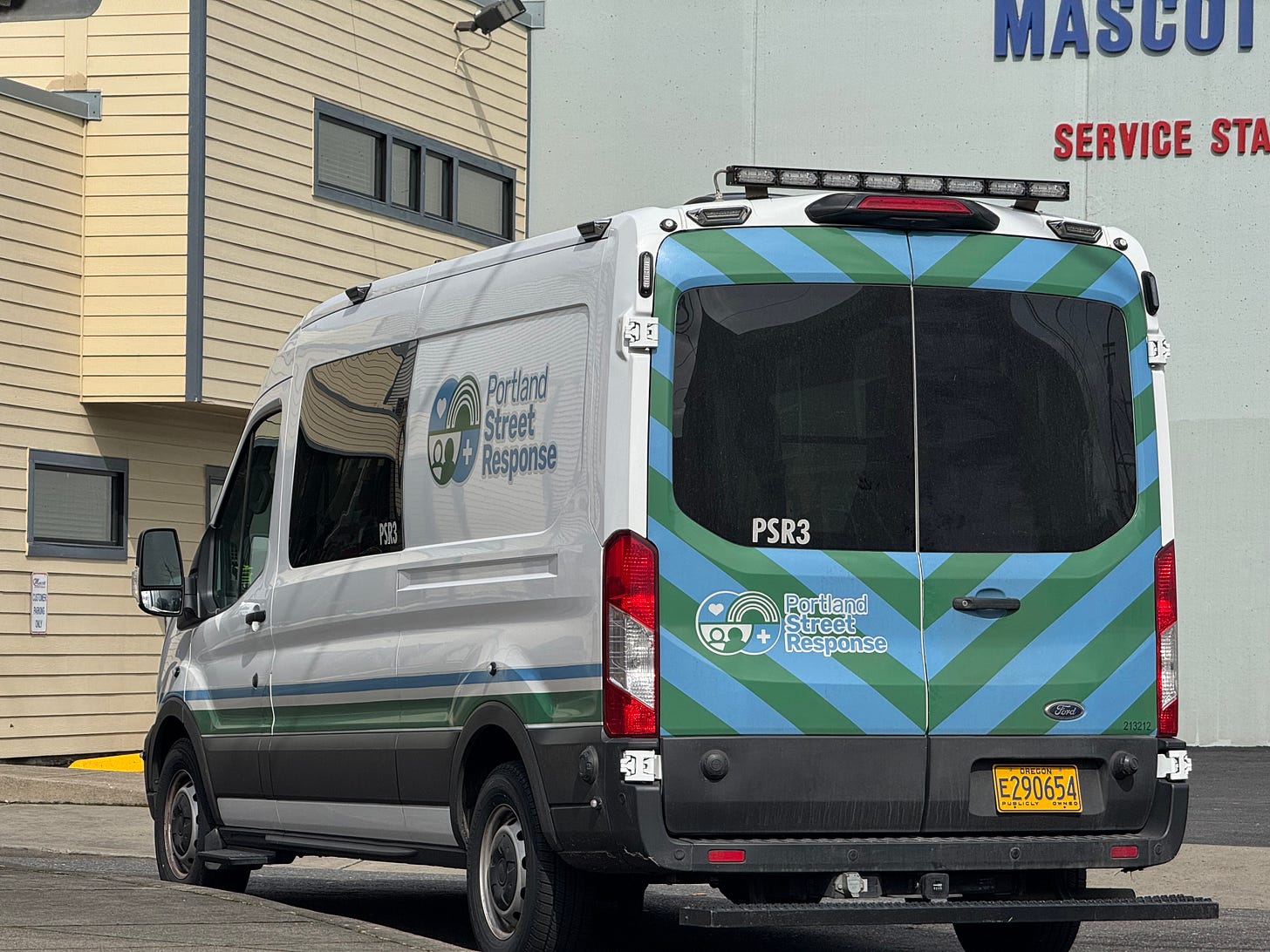Resolve to strengthen Portland Street Response
Portland City Council Public Safety Committee will vote on a resolution that directs Portland Street Response to grow into a 24-7, co-equal branch of the first responder system
This coming Tuesday, April 22, the Portland City Council Public Safety Committee will review a resolution to stabilize and strengthen Portland Street Response.
Three of the five committee members need to vote to refer it to an upcoming full council meeting. Register to testify or write to the committee members: Committee Chairs Sameer Kanal (District 2) and Steve Novick (District 3); Councilors Angelita Morillo (District, Eric Zimmerman (District 4) and Loretta Smith (District 1).
Kanal and Morillo introduced the resolution, along with Councilor Candace Avalos (District 1).
What’s at stake?
Portland Street Response is a “people’s program” — an entirely new first responder system borne from popular demand beginning in 2019, after Portlanders learned that over half arrests were of unhoused people. Many of the reasons for those arrests were essentially crimes of homelessness.
Portland Street Response sends teams of crisis workers and medics to encounter crises, rather than police. Portland police have a history of violence toward people, including people who are mentally ill and homeless. Black Portlanders have been disproportionately killed. The late Dan Handelman kept meticulous track of these shootings and deaths by police. The Department of Justice put the Portland Police under a DOJ consent decree following the killing of James Chasse in 2006
I am writing a book now about an emerging 21st century branch of first response in the United States. Many of these programs have started out as alternative to the police — unarmed responder teams who rely on deescalation rather than badges and guns. As I’ve written about, over 100 programs across the United States are dispatched by 911, and some, such as Albuquerque, New Mexico; Durham, North Carolina; and Amherst, Massachusetts are designed as co-equal branches.
This Portland City Resolution will designate that Portland Street Response becomes a co-equal branch and run 24-7. After several years of backtracking — former Commissioner Renee Gonzales headed the program from 2022-2024, reducing staffing and supplies — the current city council is composed of many people who campaigned on strengthening it.
It’s a new day in Portland.
The resolution includes many tenets of the evaluations of the program during its first two years: that culturally specific communications expand so more communities know what it is and how to use it; that it provide transportation for people who often need to get somewhere when they are in crisis; and that the city not use it for coercive means (such as collaborative with camp sweeps), thus breaking trust; that city council set up a community advisory committee.
All of this, of course, needs a budget to support it. That’s next: Mayor Keith Wilson will release a budget for city council to pass before the end of the fiscal year (June 30). Earlier reports indicate a budget that supports 68 full-time responder positions, which is good progress. Portland Street Response likely needs upwards of 80 to be adequately staffed for 24-7 operations, and will likely need bigger facilities to support this growth; currently, it’s renting space from the Portland fire union.
Challenges
Portland faces a budget shortfall. Councilor Steve Novick has been combing through the police bureau data to find calls that could shift to Portland Street Response. While “unwanted persons” calls are already coded to Portland Street Response, 911 dispatches police whenever PSR isn’t available. Getting adequate staffing as well as staffing it 24-7 will help shift more of these calls to PSR. Novick is also looking at welfare checks. This could ultimately save lives.
Smaller teams of PSR crisis workers dispatched in a van are both less overwhelming for a person in crisis and also less costly for the city than multiple fire engines or large teams of police officers.
Au Nguyen, an organizer with Friends of PSR, estimates that current Portland Street Response, per headcount, cost roughly half as much as police, based on current budgets.
But that doesn’t keep programs from backtracking. Shockingly, the Eugene city government dumped its 36-year-old contract with CAHOOTS. CAHOOTS was the model for many programs nationwide, including PSR.
This is a reminder that people across Portland cannot let down on our support for Portland Street Response. We built it; now we have to take care of it.
What’s ahead
Five of the current city council members campaigned by pledged to support Portland Street Response in the manner outlined in this resolution. Mayor Wilson has already announced expansion of the program. As we figure out our new form of government together, it’s important that we build it into a co-equal branch through both city council and through the administration led by the mayor.
The public safety committee has to refer the resolution to full council, and community members need to testify in both cases. At the same time, the mayor will refer the 2025-26 budget to city council, and the community will need to communicate the importance of funding PSR.
Then, per the passage of the resolution, council will form an advisory committee, so there will be more ways for the community to continue to shape Portland Street Response into a co-equal branch of the first responder system.
I’ll keep writing about this, but also, join the efforts of Friends of Portland Street Response to stay involved.





Thank you, Kaia for information and inspiration. I'm forwarding this to my neighbor.
Thank you, Kaia, for alerting us to testify and providing the pathway to let our voices be heard.